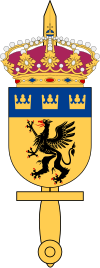Middle Military District (Swedish: Mellersta militärområdet, Milo M) was a Swedish military district, a command of the Swedish Armed Forces that had operational control over Middle Sweden, for most time of its existence corresponding to the area covered by the counties of Östergötland, Södermanland, Stockholm, Uppsala, Västmanland, Örebro, Värmland, Kopparberg (now Dalarna County) and Gävleborg. The headquarters of Milo M were located in Strängnäs.
| Middle Military District | |
|---|---|
| Mellersta militärområdet | |
 | |
| Active | 1991–2000 |
| Country | |
| Allegiance | Swedish Armed Forces |
| Branch | Multi (Sea, Air and Land) |
| Type | Military district |
| Role | Operational, territorial and tactical operations |
| Garrison/HQ | Strängnäs |
| March | "I parad" (Trobäck)[note 1] |
History
editMilo M was created in 1991 when the number of military districts of Sweden was decreased to five, and as a consequence of that, the Eastern Military District (Milo Ö) was merged with Bergslagen Military District (Milo B) to create this new military district. In 1993, the number of military districts of Sweden was decreased to three, and as a consequence of that, the territory of Gävleborg County formerly part of Lower Norrland Military District (Milo NN), was merged into the military district. In 2000, these last three military districts were disbanded and the command for the whole of Sweden was placed at the Swedish Armed Forces Headquarters, in accordance with the Defence Act of 2000.
Heraldry and traditions
editCoat of arms
editThe coat of arms of the Middle Military District Staff 1991–2000. It was also used by the Central Military District Staff 2000–2005. Blazon: "Or, the provincial badge of Södermanland, a griffon segreant sable, armed and langued gules, on a chief azur three open crowns fesswise or. The shield surmounting an erect sword of the last colour."[2]
Medals
editIn 2000, the Mellersta militärområdesstabens (MilostabM) minnesmedalj ("Middle Military District Staff (MilostabM) Commemorative Medal") in silver (MiloMSMM) of the 8th size was established. The medal ribbon is of yellow moiré with a black stripe on each side and a broad red stripe on the middle.[3]
-
The commemorative medal
-
Ribbon bar
Commanding officers
editMilitary commanders
edit- 1991–1994: Torsten Engberg
- 1 July 1994–1998: Dick Börjesson
- 1998–2000: Percurt Green
- 2000–2000: Kjell Koserius
Chiefs of Staff
edit- 1991–1992: Bengt Anderberg
- 1992–1993: Svante Bergh
- 1994–1995: Lennart Rönnberg
- 1995–1997: Anders Lindström
- 1997–2000: Kjell Koserius
Names, designations and locations
edit| Name | Translation | From | To | |
|---|---|---|---|---|
| Middle Military District | Mellersta Military District | 1991-07-01 | – | 2000-06-30 |
| Avvecklingsorganisation | Decommissioning Organisation | 2000-07-01 | – | 2001-03-31 |
| Designation | From | To | ||
| Milo M | 1991-07-01 | – | 2000-06-30 | |
| Location | From | To | ||
| Strängnäs Garrison | 1991-07-01 | – | 2001-03-31 |
See also
editFootnotes
edit- ^ The march was adopted in 1994 and was established on 13 June 1996. It was used by the Central Military District from 2000 to 2005.[1]
References
editNotes
edit- ^ Sandberg 2007, p. 78
- ^ Braunstein 2006, p. 17
- ^ Braunstein 2007, p. 112
- Braunstein, Christian (2006). Heraldiska vapen inom det svenska försvaret [Heraldry of the Swedish Armed Forces] (PDF). Skrift / Statens försvarshistoriska museer, 1101-7023 ; 9 (in Swedish). Stockholm: Statens försvarshistoriska museer. ISBN 91-971584-9-6. SELIBR 10099224.
- Braunstein, Christian (2007). Utmärkelsetecken på militära uniformer [Decorations on Swedish military uniforms] (PDF). Skrift / Statens försvarshistoriska museer, 1101-7023 ; 12 (in Swedish). Stockholm: Statens försvarshistoriska museer. ISBN 978-91-976220-2-8. SELIBR 10423295.
- Holmberg, Björn (1993). Arméns regementen, skolor och staber: [en uppslagsbok] : en sammanställning (in Swedish). Arvidsjaur: Svenskt militärhistoriskt bibliotek (SMB). ISBN 91-972209-0-6. SELIBR 7796532.
- Sandberg, Bo (2007). Försvarets marscher och signaler förr och nu: marscher antagna av svenska militära förband, skolor och staber samt igenkännings-, tjänstgörings- och exercissignaler (in Swedish) (New ed.). Stockholm: Militärmusiksamfundet med Svenskt marscharkiv. ISBN 978-91-631-8699-8. SELIBR 10413065.
Web
edit- Kjelldorff, Lennart (2001). "Försvarets utveckling från Gustav Wasa till vår tid" (PDF). Försvarets Historiska Telesamlingar. Archived from the original (PDF) on 2011-07-22. Retrieved 2007-01-12.